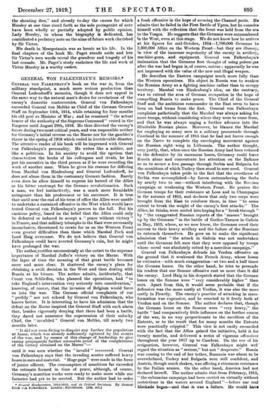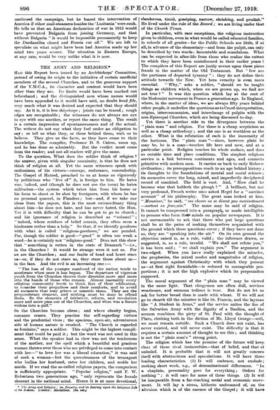GENERAL VON FALKENHAYN"S MEMOIRS.• GENERAL VON FALKENHAYN'S book on the
war is, from the military standpoint, a much more serious production than General Ludendorff 's memoirs, though it does not appeal in the same way to the natural man's desire for revelations of the enemy's domestic controversies. General von Falkenhayn succeeded General von Moltke as Chief of the German General Staff on September 14th, 1914, while retaining for four months his old post as Minister of War ; and he remained " the actual bearer of the authority of the Supreme Command" vested in the Emperor until August 29th, 1916. He thus directed the enemy's forces during two most critical years, and was responsible neither for Germany's initial reverse on the Marne nor for the gambler's throw in the spring of 1918 which ended in irretrievable disaster.
The attentive reader of his book will be impressed with General von Falkenhayn's personality. He writes like a soldier, not like a politician. In his anxiety to avoid the egotism that characterizes the books of his colleagues and rivals, he has put his narrative in the third person as if he were recording the work of another man. When he gives his reasons for differing from Marshal von Hindenburg and General Ludendorff, he does not abuse them in the customary German fashion. Rarely even does he allow himself to express his hatred of the Allies or his bitter contempt for the German revolutionaries. Such a man, we feel instinctively, was a much more formidable antagonist than his predecessor or his successor. It is true that until near the end of his term of office the Allies were unable to undertake a sustained offensive in the West which would have tested General von Falkenhayn's powers to the full. But his cautious policy, based on the belief that the Allies could only be defeated or induced to accept a " peace without victory " in France, and that military triumphs in the East were necessarily inconclusive, threatened to create for us on the Western Front even greater difficulties than those which Marshal Foch and Lord Haig overcame. We do not believe that General von Falkenhayn could have averted Germany's ruin, but he might have prolonged the war.
The author,testifies unconsciously at the outset to the supreme importance of Marshal Joffre's victory on the Marne. With the lapse of time the meaning of that great battle becomes more and more clear. It shattered the enemy's plans for obtaining a swift decision in the West and then dealing with Russia at his leisure. The author admits, incidentally, that Count von Schlieffen, who planned the operations, had " to take England's intervention very seriously into consideration," knowing, of course, that the invasion of Belgium would force us into the war. The German official complaints of our perfidy " are not echoed by General von Falkenhayn, who knows better. It is interesting to have his admission that the defeat on the Marne inspired the General Staff with such alarm that, besides vigorously denying that there had been a battle, they dared not announce the supersession of their unlucky Chief, the invalided " General von Moltke, till nearly two months later.
" It did not seem fitting to disquiet any further the population at home, which was already sufficiently agitated by the events of the war, and by means of this change of leadership to give enemy propaganda further ostensible proof of the completeness of the victory obtained on the Marne"— until it was seen whether the " invalid " recovered. General von Falkenhayn says that the invading armies suffered heavy
losses in men and material. " Huge gaps " were made in the force of junior officers. The consumption of munitions far exceeded the estimate formed in time of peace, although, of course, Germany's munition works were ready to make more while our factories had yet to be erected. But the author had to order
• General Head traders, 1914-1016, and its Critical Decision:. By General Erich v:.,n Salkenhaya Landon : Hutchinson. [24a. net.) a fresh offensive in the hope of securing the Channel ports. He admits that he failed in the First Battle of Ypres, but he consoles himself with the reflection that the front was held from the sea to the Vosges. He suggests that the Germans were outnumbered in the West, even at this stage. We do not know how he arrives at his figures for mid-October, 1914-1,700,000 Germans to 2,300,000 Allies on the Western Front—but they are illusory, in view of the immense superiority of the enemy in artillery, machine-guns, and equipment. General von Falkenhayn's insinuation that the Germans first thought of using poison-gas after the war had begun is, of course, untrue ; apparently he was not impressed with the value of the new and illegal weapon.
He describes the Eastern campaigns much more fully than the Western operations. His object in Russia was to weaken the Russian Army as a fighting machine rather than to occupy territory. Marshal von Hindenburg's idea, on the contrary, was to extend the area of German occupation 'in the hope of compelling Russia to make peace. The Chief of the General Staff and the ambitious commander in the East seem to have been on bad terms from the first. General von Falkenhayn complains pathetically that the Marshal was always asking for more troops, without considering where they were to come from, and that he was always urging a further advance into the illimitable Russian plains. Moreover, he blames the Marshal for employing so many men in a military promenade through Courland in the summer of 1915 that he had not forces enough on the Narev to complete the enveloping movement against the Russian right wing in Lithuania. The author thought, very justly, that, when once the Russian Army had been reduced to the defensive by its enormous losses, Germany could leave Russia alone and concentrate her attention on the Balkans so as to secure a free passage through Serbia and Bulgaria for the munitions of which Turkey then stood in sore need. General von Falkenhayn takes pride in the fact that the overthrow of Serbia was accomplished—by forces outnumbering the Serbs by nearly two to one—without interfering with the Russian campaign or weakening the Western Front. He praises the German troops for their resistance at Loos and in Champagne in the autumn of 1915, and declares that only two corps were brought from the East to reinforce them, in time " to some extent to break the weight of the enemy's first attacks." The Allies, he thinks, were misled into hoping for a " break through " by " the exaggerated Russian reports of the ' masses' brought up by the Germans " in the battle of Gorlice-Tarnow in Galicia in May, 1915, where, as we now know, the Germans owed their success to their heavy artillery and the failure of the Russians to entrench themselves. He goes on to make the significant admission that " the attack in Galicia was not undertaken until the Germans felt sure that they were opposed by troops whose moral was absolutely rotted by a merciless campaign."
General von Falkenhayn defends his Verdun offensive on the ground that it weakened the French Army, whose losses he estimates—with much exaggeration—at two and a half times the German losses. On the other hand, he tries to persuade his readers that our Somme offensive cost us more than it did the enemy. Lord Haig in his despatch stated that the German losses on the Somme were " very considerably higher " than ours. Apart from this, it would seem probable that if the defensive was the more costly at Verdun, it was also the more costly in Picardy. The enemy's practice of attacking in mass- formation was expensive, and he resorted to it freely both at Verdun and on the Somme. The author declares that, though the German losses on the Somme were " very heavy," the battle " had comparatively little influence on the further course of the war, in no way proportionate to the sacrifices of the Entente, or to the result that for many months the Entente were practically crippled." This view is not easily reconciled with the fact that the Allies gained the initiative, held it for twenty months, and delivered a series of vigorous offensives throughout the year 1917 up to Cambrai. On the eve of his resignation, however, General von Falkenhayn might well regard the situation as " serious," but not " desperate." Russia was coming to the end of her tether, Rumania was about to be overwhelmed, Turkey and Bulgaria were still confident, and Austria, though much shaken, was offering a strenuous resistance to the Italian armies. On the other hand, America had not declared herself. The author admits that from February, 1915, " the submarine campaign had been carried on virtually without restrictions in the waters around England "—before our real blockade began—and that it was a failure. He would have ,continued the campaign, but he feared the intervention of America if other mail-steamers besides the `Lu.sitania ' were sunk. He tells us that an American declaration of war in 1915 would have prevented Bulgaria from joining Germany, and that without Bulgaria " it would be impossible permanently to keep the Dardanelles closed and Russia cut off." We are left to speculate on what might have been had America made up her mind two years sooner. The situation in Eastern Europe, at any rate, would be very unlike what, it is now.



























 Previous page
Previous page